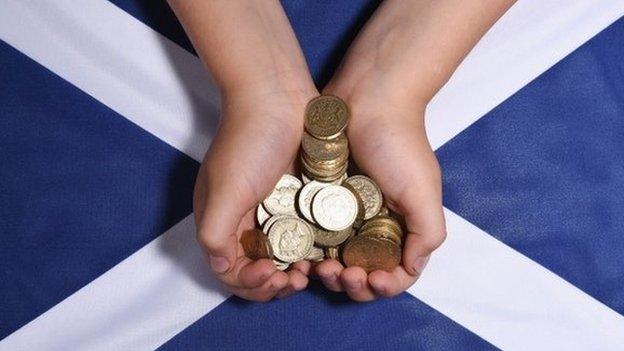How do people in Motherwell feel one month after Scottish referendum result?
- Published
.jpg)
Peter Ross from the Railway Tavern has joined the SNP following the referendum
The majority of people in Motherwell who voted in last month's referendum supported an independent Scotland. A month after the vote that rejected independence, what is the feeling on the streets of the North Lanarkshire town?
"I've never felt politically engaged at all in the last 10 or 15 years," says Peter Ross, as he stands behind the bar at the Railway Tavern in Motherwell.
"But the referendum got me interested. I thought it was time to step up and get involved."
Peter, the manager of the town centre pub, was a Labour voter for many years but the 43-year-old says he joined the SNP following last month's vote.
"In a town with the Ravenscraig Steelworks, it stuck in a lot of people's throats that they (Labour) stood on a platform with the Conservative Party. All the old guys who come in here - Labour men, all hard-working - those people got abandoned in the 80s.
"It has happened to the Liberal Democrats down south. Their vote has been obliterated. I think it will happen here for Labour as well.
"They don't fight for the working person any more. I feel they have abandoned their principles."
On a dreich morning in Motherwell, I was keen to discover what people in an area that voted Yes thought of the political landscape just over a month after Scotland rejected independence.
Unsurprisingly, the majority of those I spoke to - like Peter - supported Yes and still do.
It also seemed that no matter if a person voted Yes or No, their mood on Scotland's political future was as dour as the weather.
Across the road from the Railway Tavern was pensioner Ila Ferrier.
"I think we should stay in the Union and stay all together," she says.
And what of 'the Vow' - the extra powers promised for Holyrood by the main Westminster parties on the eve of the referendum vote?
With Lord Smith's commission holding cross-party talks with the aim of agreeing legislation in the New Year, what do voters here think?
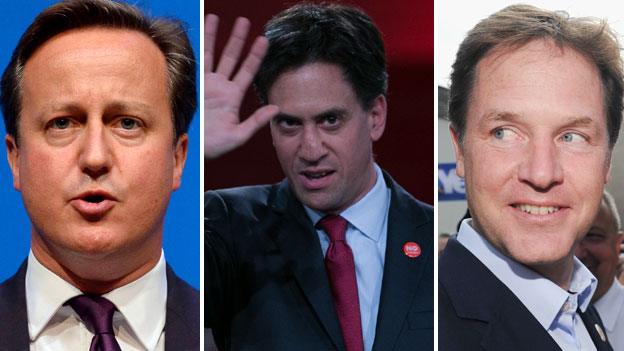
David Cameron (left), Ed Miliband (centre) and Nick Clegg have all promised to deliver more powers to Scotland
"Nothing has happened yet with the promises. If they do, will it help?", asked Ila.
"I feel for the young ones. I am 81. I am going out of this world. But for the young ones, who are just leaving school. So many are on the social (benefits)
"Labour - at the General Election, I think people will go back."
Motherwell is part of North Lanarkshire. Along with Glasgow, West Dunbartonshire and Dundee, a majority of its voters (51% in North Lanarkshire's case) voted Yes. The other 28 council areas in Scotland voted No. In Motherwell and Wishaw, the vote was 29,102 for Yes to 27,848 for No., external
A town of about 30,000 people, Motherwell is still remembered as the site of the Ravenscraig Steelworks.
It was the beating heart of not just the town, but of Lanarkshire.
However, in 1992, the steelworks finally closed. Margaret Thatcher, the Tory prime minister throughout the 1980s, was, and still is, blamed by many for the town's problems.
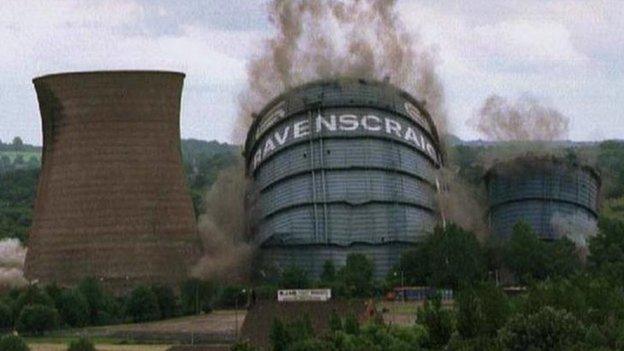
Ravenscraig Steelworks was demolished, bringing an end to the town's steel industry
Since 1945, Motherwell has been held by Labour in Westminster. The current MP Frank Roy enjoys a majority of 16,806. When you hear phrases like 'Labour Heartlands', places like Motherwell come to mind.
But a Yes vote here and in other Labour strongholds has led to questions over the future of the party. This is a recurring theme on the streets of Motherwell, along with a general scepticism over additional powers and if they will be delivered.
William Bell, 75, is a retired bricklayer and driver for the NHS, who voted Yes. He stopped supporting Labour following conflicts in Iraq and Afghanistan, and the premiership of Gordon Brown.
"Life goes on. We need the additional powers. A promise is a promise," he says.
Asked what will happen if 'the Vow' is not delivered, he says: "I think Labour will not have too much in Motherwell."
Sam McVey, meanwhile, voted No but the 67-year-old would change his vote to Yes if the referendum was held now.
"I voted No as I never had it explained to me how my pension would go. But now, when I listen to (Ed) Miliband, and the other ones - it is a certainty they are going to backtrack.
"Margaret Thatcher killed this town. I was always a Labour man - I worked in mines and the steelworks. But I will never vote Labour again."
.jpg)
The town centre of Motherwell, one of the areas that voted Yes in last month's referendum
.jpg)
Staff at the Windmills Cafe, including Patricia Weston (centre third from left) and Keith Campbell (second right)
On Brandon Parade in the town centre is The Windmills Café. A National Lottery-funded business, it employs young people with learning difficulties to give them experience of the workplace.
Inside is 50-year-old Patricia Weston, a job coach, and 21-year-old Keith Campbell who works in the café.
Patricia describes herself as "a proud 45er" - a reference to the 45% of Scots who voted Yes on 18 September.
She says: "The next General Election - I don't think the Conservatives will win it themselves. I think there will be coalition again and I think it will be with UKIP, and that scares me."
Keith, meanwhile, voted No.
He says: "I feel I made the right decision. The referendum was the first time I voted and became involved. I knew there might have been change with Scotland going independent, so I wanted to have my say. I want things to stay the same."
.jpg)
William Bell voted Yes and said "life goes on"
.jpg)
Clayr Caddell (left) voted Yes while her sister Emma Fraser (right) voted No
Keith, like many of the other young people in the café, voted for the first time at the referendum and plans to do so again at the General Election.
Another young voter is Emma Fraser. The 22-year-old was shopping in Brandon Parade with her sister Clayr Caddell.
Emma voted No, as she had just bought a house and was concerned about mortgage rates in an independent Scotland.
Clayr, 37, voted Yes.
She says: "I do think this is going to keep going. There are more people into politics than were before."
The sisters laughed about their differing opinions over how to vote in the referendum. This is in tune with other voters here. It seems there is no lingering divisiveness over the campaign between families and friends in Lanarkshire, regardless of how they voted.
What is apparent is great deal of scepticism over additional powers, and questions over the future of the Labour party in Scotland.
Like everything else following the referendum, only time will tell.
- Published16 October 2014
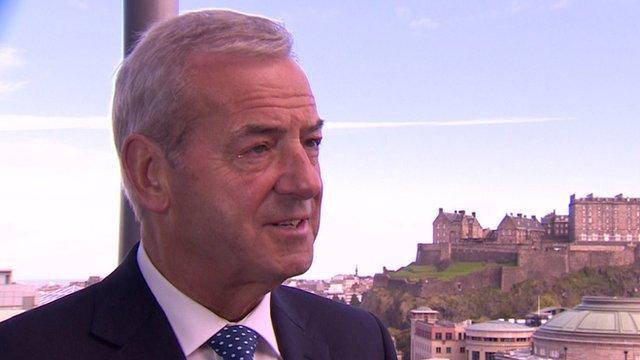
- Published16 October 2014
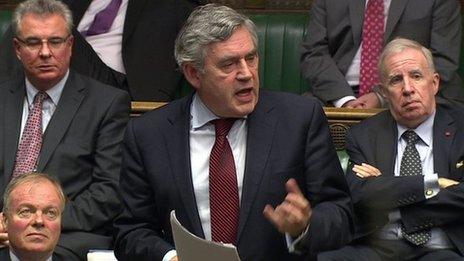
- Published26 November 2014
